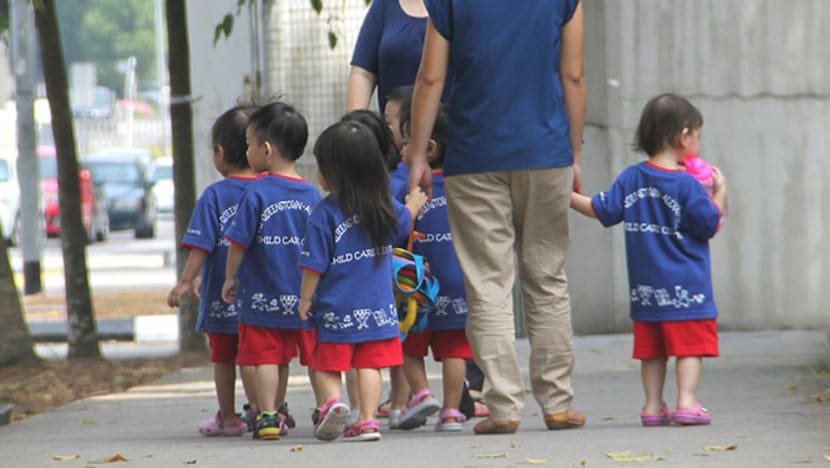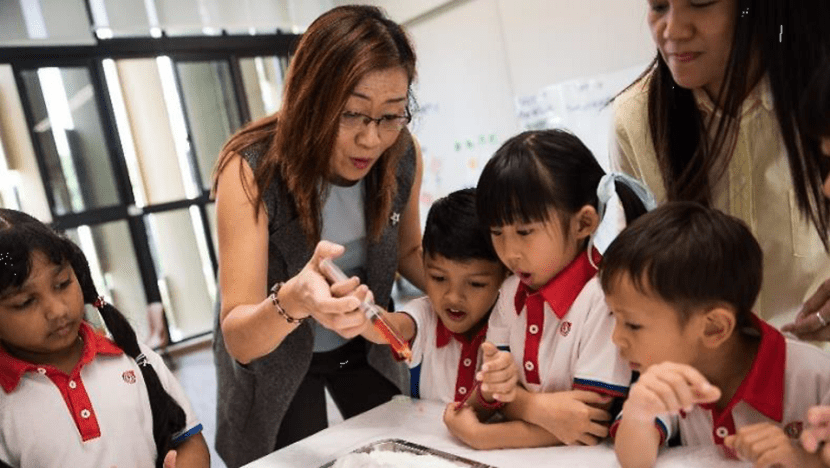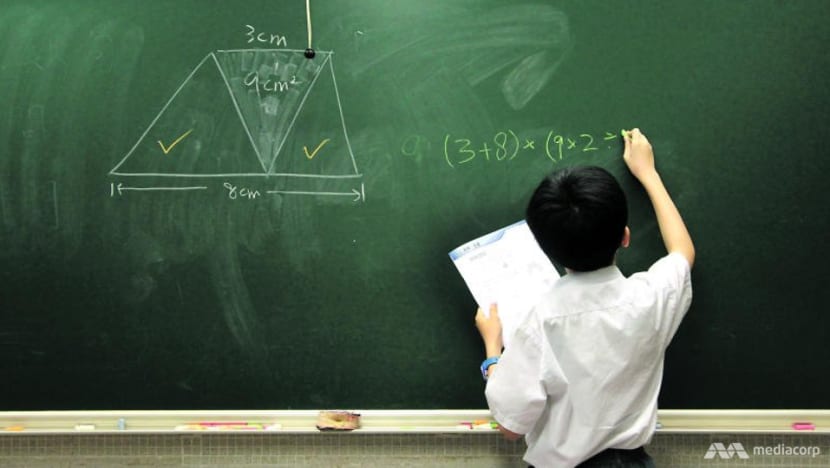commentary Commentary
Commentary: Children from low-income families and the power of ‘significant adults’
Budget 2021 unveiled greater support for lower-income households and families with children with special needs but to get vulnerable children to level up, we need to look closer to home, says June Yong.

File photo of children in pre-school.
SINGAPORE: In his speech on Tuesday (Feb 16), Deputy Prime Minister Heng Swee Keat described inequality as a “mega-shift” in the wake of COVID-19.
The pandemic had indeed laid bare the fault lines between the haves and have-nots – especially when it came to implementing the great Home-Based Learning (HBL) exercise during the circuit breaker last year.
So it came as no surprise that more resources will be ploughed into ensuring the most vulnerable families will get more help in the development and caring for children of all ages.
HELP FOR VULNERABLE FAMILIES ENHANCED OVER THE YEARS
Notably, ComLink, an initiative that offers a holistic suite of social services to families living in rental housing, will be expanded to cover 14,000 low-income families over the next two years.
Such help could take the form of parenting workshops, reading and numeracy programmes, or partnering with various organisations to run family bonding events.
READ: Record low in income inequality due to ‘massive transfers’, schemes tilted towards lower-income groups: Heng Swee Keat
The Government will also be piloting an Inclusive Support Programme, which will integrate early intervention and early childhood services for children who require up to medium levels of early intervention support.
It is well-documented that underprivileged families grapple with multiple challenges and disadvantages, with limited financial and social capital being the key issues.
Arising from that, care-givers tend to spend very little time with children because they have to work, often at odd hours and sometimes in unpredictable changes in shifts.

Such a deficit of family resources has been shown to adversely affect children’s well-being, in particular their physical and emotional health, as well as their cognitive abilities and academic achievement.
In Singapore, education is often touted as a key route for social mobility and a key factor in a family’s ability to break out of the poverty cycle.
The Government has also in recent years implemented policies that aim to level the playing field. The KidSTART programme is one such programme; it provides parental training, community-based playgroup sessions, and learning support for preschool-aged children.
READ: Budget 2021: Support for low-wage workers, lower-income families, children with special needs and charities
The Ministry of Education (MOE) has a Financial Assistance Scheme which covers day-to-day expenses, such as a daily meal allowance, transport allowance, and also free textbooks and stationery supplies.
In spite of these efforts to level the playing field, it is not uncommon to find children from these backgrounds still lagging behind their peers.
What more can be done to close the performance gap?
THE POWER OF ONE SIGNIFICANT ADULT
Studies have found that what makes a difference in academic achievement for students from low-income groups is a supportive relationship with a trusted adult – usually either a parent or teacher.
One particular Singapore-based study titled Why Some Children From Poor Families Do Well examined children from low-income families who defied the odds and exhibited academic success.
It found supportive evidence that the relationship contexts, particularly between the children and their mothers, positively impacted the children’s sense of agency and motivation at school.
But the very nature of human bonding means that time, energy, and effort needs to be invested in the parent-child relationship – something that can prove tricky to do if the parents are also overwhelmed by the need to provide financially for the family.

Part of the dilemma stems from the deep-seated meritocracy in Singapore, where the focus is on the majority moving up and not those who struggle at the bottom.
While the MOE has announced that streaming will be phased out by 2024, for years, children were sorted by the time they were ten, thereby adjusting the expectations that caregivers or teachers placed on them.
READ: Commentary: Catalysing help to overcome inequality in all its forms
It is an efficient system but one could argue, not an inclusive one.
What might make a difference, however, seems to be a more proactive outreach to the families of at-risk children. In the US, preschool projects that featured home visits and enlisted parental involvement reported positive and sustained results – even through high school.
So the question now becomes, how else can these children level up and more specifically, who else in their community can step in to help?
THE SOCIAL IMPACT OF ENTERPRISES
Beyond Social Services, a charity dedicated to helping children and youths from less privileged backgrounds break away from the poverty cycle, commissioned research to examine the factors surrounding the high failing rate of primary school children from low-income families.
The analysis cited findings from the National Volunteer and Philantrophy Centre that two in three people are willing to volunteer through their organisation. As enterprises accounted for the bulk of donations made in 2012, the paper also concluded that business groups have the highest financial potential.
READ: Commentary: Inequality has a geographic dimension - between and within neighbourhoods in Singapore
I once interviewed the founder of a popular Math enrichment centre, and he shared that because he received the help and encouragement from a teacher when he was struggling, he now does the same for some of the youths that attend his classes.
A successful and committed ground-up initiative is ReadAble. Since 2014, ReadAble has been running weekly reading and language arts classes for children in a neighbourhood in Chin Swee.
It has worked because it is based on the simple premise that there needs to be an adult present to read to a child. The volunteer teachers also forge strong relationships with the children. And these have a multiplier effect.
Imagine then if there were businesses in every neighbourhood that would not only encourage their employees to volunteer to serve needy families, but also offer internships or part-time jobs for youths with needs.

Or if there was better collaboration between non-profit organisations and schools to enable the provision of fun or educational activities as part of after-school care.
Enterprises and religious organisations could also reach out to parents, befriend them, and try to forge parent support groups.
When such community resources are leveraged and maximised (of course enabled by Government leadership), these families are helped without the notion that they are getting handouts. These small steps could make a world of difference in the lived experiences of children from disadvantaged families.
GOING BEYOND THE LABELS
When dealing with the complex issue of inequality, sometimes the biggest barrier is that of the mind.
As the saying goes: “Whether you think you can or you think you can’t, you’re right.”
When a child has had to deal with chronic stress and adverse circumstances at home, they may begin to believe that nothing they do would be able to change anything.
READ: Commentary: Home-based learning can be an opportunity to rethink parenting
As a friend who’s a teacher remarked: “These children need to be given opportunities to experience success at times; otherwise it can be very demoralising to always be only able to handle a small percentage of what is taught.”
Tempering the academic expectations for these students, helping them discover their strengths and setting realistic goals may create a spark that changes their trajectory in life.
It may also help them realise that a mere label – whether it is special needs or low SES – does not dictate the course of their lives.
The government’s effort in expanding the circle of help to the most vulnerable groups among us is timely, but inclusivity begins with us.
Just calling out inequality isn’t enough – we need to roll up our sleeves and pitch in so we can be a significant adult to a disadvantaged child and hopefully, that will pay dividends in the years to come.
These children may not have a choice in the kind of circumstances or families they have, but we can try our best to make sure they don’t pay too high a price for their station in life.
SIGN UP: For CNA’s Commentary weekly newsletter to explore issues beyond the headlines
June Yong is a mother of three, an educational therapist and owner of Mama Wear Papa Shirt, a blog that discusses parenting and education in Singapore.














